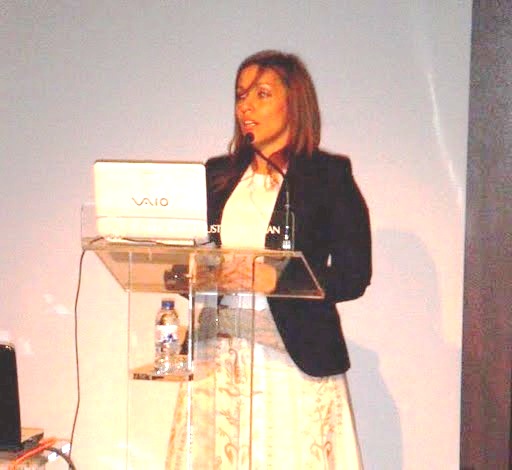FRFG Conference on the introduction of the EU2020 Strategy (2010)
 On June 24, 2010, the conference “The EU 2020 Strategy — Does it set up Europe for the 21st Century?” was held in Berlin. EU 2020 is the successor to the Lisbon Agenda. The conference was organized by the European Commission in Germany and the FRFG in order to increase the profile of the strategy. In three panel discussions, “Sustainable Growth”, “Smart Growth” and “Integrative Growth”, experts and officials of the EU-commission and of the German government discussed important aspects of the strategy. The FRFG was represented by Professor Rolf Kreibich, chairman of the Board of Trustees, and Patrick Wegner, research assistant at the FRFG.
On June 24, 2010, the conference “The EU 2020 Strategy — Does it set up Europe for the 21st Century?” was held in Berlin. EU 2020 is the successor to the Lisbon Agenda. The conference was organized by the European Commission in Germany and the FRFG in order to increase the profile of the strategy. In three panel discussions, “Sustainable Growth”, “Smart Growth” and “Integrative Growth”, experts and officials of the EU-commission and of the German government discussed important aspects of the strategy. The FRFG was represented by Professor Rolf Kreibich, chairman of the Board of Trustees, and Patrick Wegner, research assistant at the FRFG.
Around 200 people participated in the full-day conference. The various experts’ opinions and the focus on the civilian society of the FRFG complemented one another profitably. The conference agenda is available here.
International Conference “Ways to Legally Implement Intergenerational Justice”, Lisbon (2010)
 Intergenerational justice is becoming one of the central issues of our time. The dramatic changes in the demographic composition of many developed countries and questions of what justice requires between older, younger, and future generations are increasingly recognised alongside more traditional considerations of social justice. Present generations ought to take responsibility for the far-reaching consequences of human actions.
Intergenerational justice is becoming one of the central issues of our time. The dramatic changes in the demographic composition of many developed countries and questions of what justice requires between older, younger, and future generations are increasingly recognised alongside more traditional considerations of social justice. Present generations ought to take responsibility for the far-reaching consequences of human actions.
Consequently, it is urgently required to legally recognise intergenerational principles and, above all, to create an architecture with enforceability through which the rights of future generations can be made effective. Marisa dos Reis is a research fellow and editor at the Foundation for the Rights of Future Generations since September 2009. She conceived of organising an international conference in Lisbon on the topic intergenerational justice and law coupled with an issue of the IGJR. FRFG strongly encouraged this suggestion. Beginning in December 2009, she was in charge of managing all aspects of the Conference and preparing for the publication of conference materials.
In the course of this project, important partnerships were forged with the World Future Council, the Portuguese Society of International Law, the Portuguese Association for the United Nations and the Jacques Delors European Information Centre. Her work at FRFG has been financially supported by the European Commission. The conference was held on the 27th and 28th of May, 2010 at the Foundation Calouste Gulbenkian and it was sponsored by Caixa Geral de Depósitos, Foundation Calouste Gulbenkian, Tribal DDB, DDB and Olissipo Marquês de Sá Hotel.
During the conference, speakers approached several ways of implementing principles of intergenerational justice principles via international law, European law and at the national level. In the course of debate and conversation between our speakers and participants, obstacles were described with unprecedented clarity and longstanding intuitions were challenged. Furthermore, innovative solutions were formulated and a path was set for ongoing consideration of intergenerational justice and the law.
Symposium “Easing the « rush hour » of life – Diversity of life courses in international comparison” (2008)
From July 4th to July 6th, 2008, the Foundation for the Rights of Future Generations (FRFG) organised a symposium on “Easing the «rush hour» of life – Diversity of life courses in international comparison”. The participants included renowned experts as well as young scientists from several European countries. In the course of the symposium, the FRFG also awarded the 4th Intergenerational Justice Price 2007/08. The symposium did not single out a specific phase of life but focus on the whole course of life.
The outlined symposium did not pursue the question “How can we use the life-years we gained due to increasing life expectancy?” because there is already a lot of research done (cp. Forschungsgruppe Altern und Lebenslauf, https://fall-berlin.de/). Instead it dealt with the issue “To what extent should we change the planning of our life right from the start, knowing that our life expectancy is higher than the one of previous cohorts?” This question focuses on the easing of the so-called « rush hour » of life between the ages of 28 and 38. During this period, people finish their apprenticeships or studies; they begin to work and have to decide whether or not to start a family. It is this crucial period of time we have to examine to detect the underlying causes for the difference between the desired and the actual number of children in Germany. The total fertility rate currently lies at 1.34 children per woman (1.26 in the Eastern part and 1.36 in the Western part of the country), whereas women desire to have 1.74 and men to have 1.57 children. Differences between the numbers for East and West Germany are on average barely detectable. East German women’s desire for children (1.73) exceeds West German women’s (1,78) only to a small extend, whereas East German men desire a little less children (1.46) than West German men (1.59) (Bib 2005, 36). These numbers already show the importance of a gender-specific analysis of the subject.
Therefore it is important to research whether an easing of the third life-decade could achieve a reduction of problematic conditions regarding the compatibility of job and family. Besides a better combination of kids and careers during this decade, the possible options for avoiding a double strain by decoupling (preference of the career, preference of family life, postponement of the career, postponement of the starting of a family) have been analysed during the project.
The symposium was divided into two parts that were in turn examined from international and gender perspectives. In short, we firstly analyse the time budget of the cohorts in question and later on their financial budgets. This approach and the consideration of both aspects allows for comprehensive conclusions.
In consistence with the international and gender perspectives, the experiences of other countries in their attempts to disentangle the « rush-hour » for the individual (both in private and professional life) as well as in relation to the welfare state and society as a whole have been examined carefully in the first part of the symposium. The differing consequences for the sexes were equally analysed. The second part focused on the age specific distribution of income, again from international and gender perspectives.
You can find the concept and programme of the symposium here. In the follow-up of the symposium, a special issue of the Intergenerational Justice Review was devoted to the topic.


